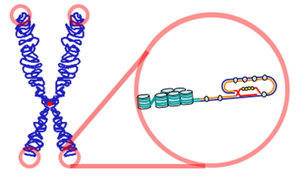Trygve Tollefsbol and his colleagues at the University of Alabama at Birmingham have set out to answer the question of why calorie restriction increases lifespans.
This sort of effect has been seen before. Calorie restriction can decrease aging in a variety of organisms ranging from nematodes to monkeys. One of the prominent theories is that calorie restriction works by decreasing insulin levels. Other theories involve reduced numbers of cell divisions, lower metabolism rates or decreased (or increased) levels of free radicals.
This time, the researchers examined human cells grown in culture. They provided human lung cells with either normal or reduced levels of glucose. When fed on reduced levels of glucose, the cells lived longer. The scientists next examined gene expression in the cells. They discovered that compared with cells fed normal amounts of glucose, the deprived cells had elevated telomerase activity and decreased p16 activity.
P16, named for the size of the protein encoded (16 kilodalton), is known to be a tumor suppressor gene. Telomerase is involved in DNA replication.
Before dividing, cells must first replicate their DNA. Because of the nature of DNA replication, the very ends of the DNA strands cannot be copied. In order to prevent the loss of necessary genetic information, the ends of DNA strands contain long repeats of non-coding nucleotides called telomeres. The telomeres form a discardable buffer zone. With each successive replication, some of that buffer is lost, until the genetic information itself is at risk. At that point, the cell can no longer divide and it dies.
Drawing of a telomere at the end of a chromosome
Telomerase is an enzyme which adds to the length of the telomeres. This increases the number of doublings a cell can undergo, and thereby increases the effective lifespan of the cell.
Interestingly, when the same conditions were applied to precancerous human lung cells, the cells showed opposite effects, with decreased levels of telomerase and increased levels of p16. Thus, not only did the calorie restriction increase the lifespan of normal cells, it also preferentially killed cancerous cells.
Calorie restriction has never been shown to be effective in humans, and even this study only looked at cells in culture, not actual human beings. Still, the results give one pause, and if nothing else, might be useful for treating cancer or other diseases.
Calorie restriction has never been shown to be effective in humans, and even this study only looked at cells in culture, not actual human beings. Still, the results give one pause, and if nothing else, might be useful for treating cancer or other diseases.

No comments:
Post a Comment